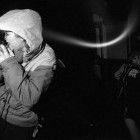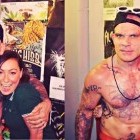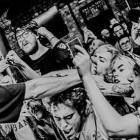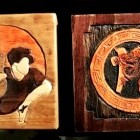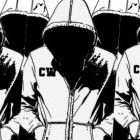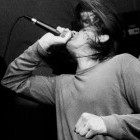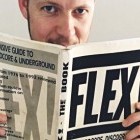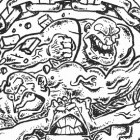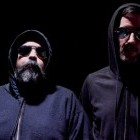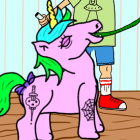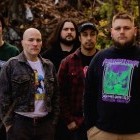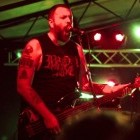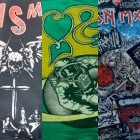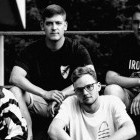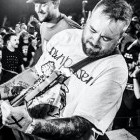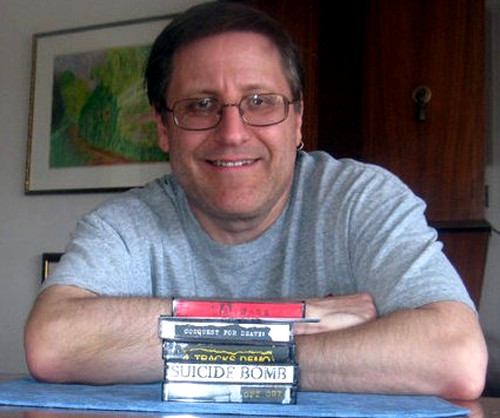
I discovered countless punk and hardcore bands through Al Quint. We might not have known each other, but during my teens and early 20s, Quint's writings in his Suburban Voice zine had a huge impact on my listening habits. Started in the early '80s, Suburban Voice would go on to be one of the longest running underground publications in the U.S., covering everyone from SSD to Big Drill Car to Los Crudos throughout its multiple-decade run.
Quint stopped doing print issues in 2003, but Suburban Voice is still a going concern, something he continues to work on and produce. No, his involvement with the punk scene has not dissipated in the least. The 56-year-old Massachussetts native stays active as a columnist for Maximumrocknroll, a vocalist for hardcore outfit Shattered Silence, and a DJ.
I recently chatted with Quint about the history of Suburban Voice, and he shared some interesting stories involving Ray Cappo, Paul Bearer, and much more.
You're obviously closely related to punk and hardcore, but what was the first kind of music that appealed to you as a kid? I imagine television was a big factor in terms of exposure for you.
I've been listening to music since I was 4 or 5 years old, going back to the '60s. I had a small red transistor radio and listened to the AM stations and when I heard a record I liked, I had my parents get it for me. I've always loved guitar-oriented rock 'n' roll and what you'd call "classic rock" these days. As I hit my teenage years in the '70s, I veered more towards hard rock and metal, although my tastes remained fairly broad (and still do). Some of my favorites in those pre-punk days were Aerosmith, Sweet, Bad Company, Ted Nugent (yeah, I know), Blue Öyster Cult, Foghat, Led Zeppelin, Bachman-Turner Overdrive, etc.
I'd say my musical taste was shaped more by radio—I did a lot of taping. I did see some music on TV. I remember Where the Action Is, in the '60s, where Paul Revere & The Raiders were the house band. In the '70s, there was a cool music video/live performance show called Superstars of Rock that I'd watch on Saturdays.
What was it like growing up in suburban Massachusetts in the '70s?
Pretty lonely. I grew up in Swampscott, a typical middle-class town. I was a studious kid and didn't have much of a social life. I didn't have that many close friends or girlfriends and I spent a lot of time in my room listening to records and devouring music magazines like Creem and Circus. That's another place where I learned about bands I should check out. I didn't go to any concerts or shows until I was in college, even though I was a passionate music fan.
Did you head into Boston a lot as a teen?
I didn't start going into Boston by myself until I was 17 or so. I did go to Lynn, the rather decrepit city next to Swampscott, quite a bit and I'd hit up record stores and thrift stores looking for stuff.
SEE ALSO: 2016 interview with Don Fury (Producer: Judge, Quicksand, Gorilla Biscuits, Underdog, Inside Out).
Do you remember how you first discovered underground/left-of-center music? Did you have a mentor in that regard?
I'd read about Iggy & The Stooges in a paperback book called Rock Revolution, and when I was at a head shop (anyone know what those are anymore?) I was looking through a crate of records and came across one with this freaky looking guy on the front. It was Raw Power, and the guy on the cover was this Iggy character I'd read about. After having the clerk play me a few songs, I grabbed it. This was in the early summer of 1976, and while I didn't know about punk yet, it was definitely a life-changer. I just thought of it as a hard rock record, but it wasn't really like anything I'd heard before.
I started listening to the college stations a bit more in 1977. I had a classmate in high school named Paul Greenberg, who was already DJing on the Salem State College station, WMWM. I guess you could say he was one of my musical mentors in that it was on his show and some of the others on WMWM (and later the other college stations) where I first heard bands like the Sex Pistols, The Clash, The Damned, Dead Boys, as well as locals like Real Kids, DMZ, Unnatural Axe, LaPeste, etc. I've always given Greeny props for being the guy who got me into punk.
Who were some of the local bands that you got into early on, before the zine?
When I got to Boston University in 1978, I started going to clubs (the drinking age was 18 at the time) and checking out local bands, in addition to the touring ones. I already mentioned some local favorites above, but between '78 and '82 when I graduated, some others were Mission of Burma (who took me a bit of time to get into), Native Tongue, The Molls, Leper, The Stains, The Freeze, Boys Life, and the Outlets. I started checking out the burgeoning hardcore scene in late '81/early '82, with all the classic bands like The F.U.'s, SS Decontrol, Gang Green, Proletariat, etc. That was around when This is Boston, Not L.A. came out.
Did you play in any bands around that time?
No. I didn't start playing in any bands until late '82. My first band was Isolated Youth. I played bass.
What was the impetus that inspired you to start doing Suburban Punk in 1982?
I'd started going to the D.I.Y. shows at the Gallery East space in mid-'82. Seeing bands like Minor Threat, Negative Approach, MDC, etc. blew my mind. I'd also seen Bad Brains, T.S.O.L., Black Flag, Flipper, and some other killer bands right before then. But the Gallery East shows were something else, something that really connected with me and I decided that I needed to write about it. I'd done some writing when I was younger, putting out small newsletters and also writing for my high school paper, but didn't do anything while I was at BU.
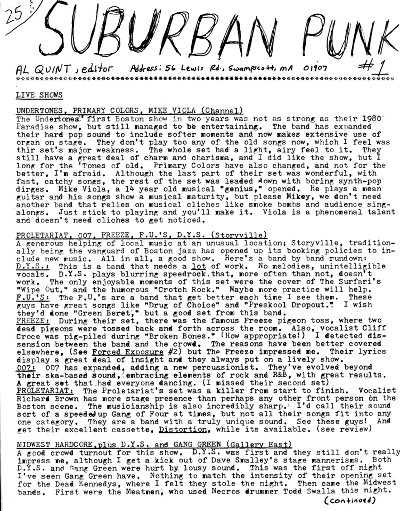
How did you go about printing and laying out those first issues? Also, how did you fund it?
My first issue was four typewritten pages of record and live reviews. I didn't even have a name for the zine when I started. I left a blank space at the top of the first page and, after I was done, I decided to call it Suburban Punk because I liked punk and was from the suburbs. What a stroke of genius, eh? I had my dad run off 50 copies at his work and I sold them outside shows for a quarter. When I sold those, I had him make me another 50. Total cost? $0. Same for the second issue, only it was done on a Ditto machine at a grade school where my mother was a substitute. I forget how many I did of that one, but it couldn't have been more than 100. Nine or 10 single-sided pages. Total cost? $0, again. Starting with the third one, I started getting it copied professionally.
The layout was pretty primitive. It was cut and paste. Single-column typed text with some poorly Xeroxed photos. Eventually, I'd go to the copy shop (or maybe it was the copy machine at work I used, I forget) and shrink the text down so I could make two columns. Needless to say, it wasn't the best-looking zine for quite a while. In fact, Forced Exposure zine named mine the worst-looking zine for one of their year-end surveys.
Issue #3 was the first one where I had any ads. Subterranean Records was the first label to take out an ad, and I also hit up a few of the local record stores.
Was distribution a huge issue in the early days? How many copies were you printing by the 10th issue?
I think I was up to 500 copies by #10, but it might have been a bit less. In terms of distribution, I sold them at shows, sold or consigned them to local record stores, did mailorder (I ran classified ads in Maximumrocknroll and Flipside), and some out of town distributors eventually picked them up. It took a while to build up any sort of distribution network, though. I did a lot of trading with people as well. I had a lot of penpals around the country and all over the world. I'd say by the time of the name change, I'd already built up a bit of an international audience. I loved corresponding with people, trading records, zines, and flyers. It was certainly different in those pre-internet dark ages.
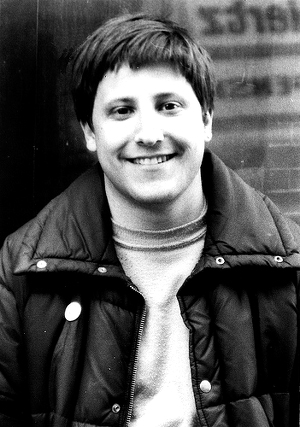
Why did you change the name of the zine to Suburban Voice?
Because I wanted to be considered more than a punk zine. Of course, for all intents and purposes, Suburban Voice remained a punk zine, but I decided to get a few columnists and also chime in more about political and social issues. We were in the throes of the Reagan era, I was 24, working a bank job that I despised, and was pretty mad at the world. So, I wanted to express that in my writing, as well as playing music. I was in my first semi-serious band, No System (although all the bands I've played in over the years were more for fun and never really went anywhere). That was another way of expressing my outrage at the world. It wasn't always that well-focused and it was definitely naïve in a lot of ways, but I needed to have those outlets to counteract the negatives in my life.
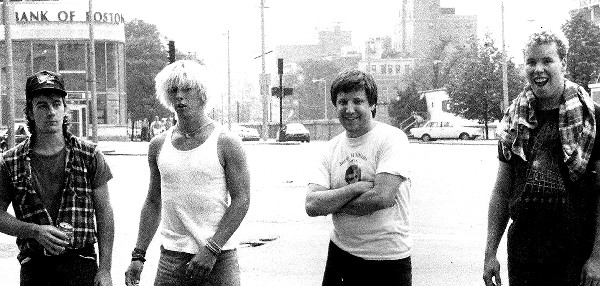
Looking back at the first few years of the zine, what were some of the highlights in terms of interviews? Did you have trouble locking in any specific interviewees?
Not too often. I remember I wanted to interview Cause for Alarm when they did a reunion in the late '80s, but they wouldn't do it. I did an interview with Die Kreuzen that went pretty badly, maybe because my questions sucked, but some of the guys in that band were really nice.
In terms of highlights, the first interview that I felt got really in-depth was with Articles of Faith for the first issue of Suburban Voice (#11). There was just a connection there and I was really inspired by the lyrics on the first two 7"s, and—later on—their first album. Interviewing the Big Boys was also a pleasure—I don't think I've ever met nicer, more down-to-earth people in all the years I've been doing this. Getting to interview the Minutemen a few months before D. Boon was killed was also memorable. Once again, down-to-earth, incredibly nice people. The interview I did with Sheer Terror was funny as hell. Completely non-PC and diametrically opposed to some of my viewpoints, but I was almost pissing myself laughing at some of their responses. ("Al Sharpton? That fat Barry White lookalike?"). Paul's a great guy and a lot of his bluster is a big act.
In terms of lowlights, there were only a few. Bad Brains was just a bizarre experience. I tried to interview HR while he was smoking a spliff the size of a cigar and stoned off his gourd. I tried to interview Tad Doyle from Tad over the phone and that just went badly. He seemed to have no interest in answering the questions.
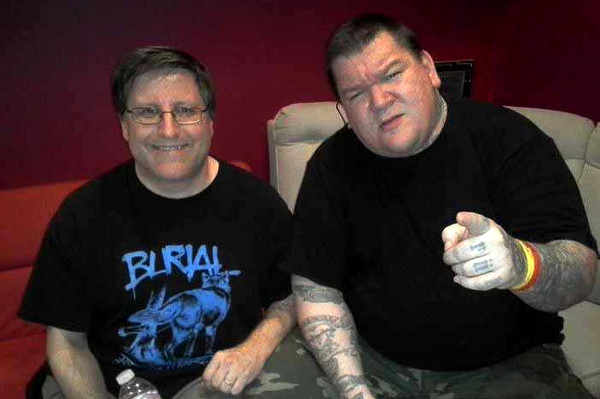
I'm sure you spent a lot of your own money on records, but were labels and publicists sending you a ton of review material during the '80s?
Yep... I got a lot of freebies back then. The bigger indie labels were very generous, especially Homestead, SST, Alternative Tentacles, Taang, and some of the metal labels like Combat, Roadrunner, and Metal Blade. I actually spend more on records now because the promos have dried up or they try to get me to review digital promos, and I refuse to do that.
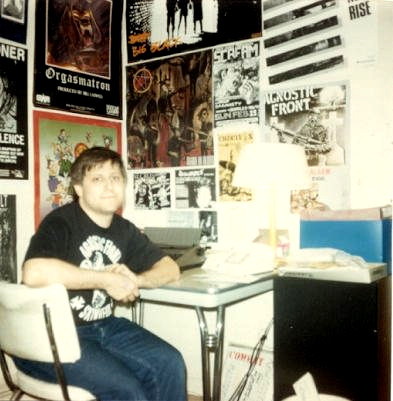
What were some of the other zines from the '80s that inspired you?
Maximumrocknroll is at the top of the list. I started my zine around the same time, but it became really important to me just because of the breadth of information, not only about music but other issues as well. I mentioned the classified ads above and I made lots of contacts and did trades. I liked Flipside a lot, as well. Locally, there were some good zines—xXx, Smash!, and Conflict, to name a few. The western Mass scene had Growing Concern and Worth Mentioning. I still have boxes of zines going back to the '80s.
SEE ALSO: Punk Posers on Parade
The first time I read Suburban Voice was sometime in the late '80s. There was something about the writing style that felt so authentic in relation to the scenes you were covering. The joy for the stuff came through.
Well, there are times I've definitely felt jaded or go through periods where the creative spark isn't always there. That still happens. I also think I did move away from underground punk and hardcore for a while, although I never stopped listening to it. From the late '80s to mid '90s, I got caught up in the Sub Pop/grunge thing, started hearing more major label stuff (at my record store job, I couldn't really play a lot of punk and a lot of "alt-rock" was getting played), and also started covering bands that got signed by the majors after Nirvana's breakthrough. But there's still some great music from that time that I love. Bands like Living Coloür, The Afghan Whigs, Red Hot Chili Peppers, Jane's Addiction, and even Soundgarden sure as hell aren't on that list anymore and probably never should have been. I refer to those bands as "What was I thinking?" I got back to the underground, D.I.Y. roots in the mid to late '90s and that's been my main focus since then.
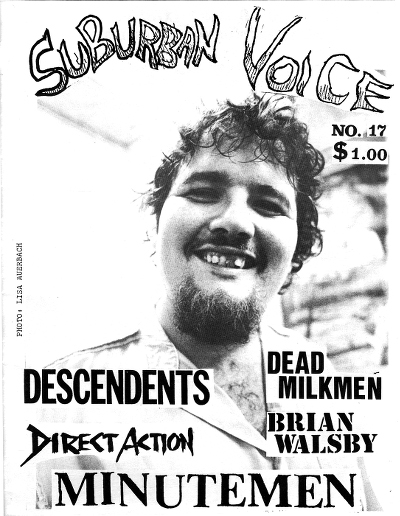
I mentioned to a friend of mine that I was going to interview you for the site and he wanted me to ask you about some Youth of Today/Ray Cappo interview stuff you did sometime in the late '80s and '90s. I've never read them, but he told me I still had to ask you.
Oh, yeah... that was rather interesting. The deal is I was put off by what I viewed as the cliquish and holier-than-thou nature of the straight edge scene, especially what was going on in New York from the late '80s and early '90s, and this was even during a period where I considered myself straight edge (I've never drank much as it is, and still don't). I did an interview with Youth of Today in '87 and it was a little testy. But the real controversy happened in the early '90s. I had problems with the increase of Krishna into hardcore, and of course Shelter was at the forefront of that. I wanted to interview Ray Cappo about it but didn't feel confident enough in my interviewing skills, so I had this idea to set up a "roundtable" of sorts where I'd have Ray, Dan O'Mahony from 411, Bill Dolan from American Standard, and Jack Kelly (Choke) from Slapshot. Bill and Jack couldn't do it, so it ended up being a joint interview with Dan and Ray and it was actually fairly interesting. Yes, I admit it was a complete setup because I figured Dan would have an easier time nailing Ray down than I would.
Anyway, fast-forward to 1994. Bill Wilson from Blackout! Records asked me if I wanted to do something like that again, but with Paul Bearer. I figured Ray might not have been too thrilled with what had transpired three years before, but Bill assured me he was cool with it. Well, that definitely was not the case. I went to the show where Shelter was playing and walked up to Ray before it started and asked if he wanted to do the interview. He looked at me and said, "I'm not doing an interview with you again. You have an agenda!" To which I told him that he was correct, and even though I disagreed with him on some issues, Bill had set it up and I was under the assumption it was okay. He relented and said he'd do it after the show, but the lineup was all crap, I didn't really want to do it in the first place, so I bailed and never did it.
I did see Ray once after that, with Better Than a Thousand, and he was friendly. I guess it's all water under the bridge now. Who knows? It's not really a major concern for me these days. I also rediscovered their We're Not in This Alone album in recent years and love the original, raw-as-fuck mix. It's just a good, pissed off hardcore record. The Repos covered the whole album for their Ending on a Positive Note release, and I went back and checked out the original again.
I recently posted an article where I talked about a few hardcore bands that went hard rock in the '80s. What was your take on that while it was happening? It seems like the Straw Dogs stuff has aged well in the ears of a lot of folks.
I didn't take to it at all, except maybe for The F.U.'s Do We Really Want to Hurt You? In all honesty, I haven't listened to the Straw Dogs for years. Jerry's Kids did a pretty good job adding some hard rock stuff to Kill Kill Kill. Funny thing is, I loved metal then and still do. I'd go see bands like Metallica, Iron Maiden, Judas Priest, Slayer, Metal Church, etc. and there was a great local metal band called Wargasm. But I was really put off by SSD's How We Rock; and DYS's second, self-titled album left me cold, although I did give it a good review at the time.
Here's a story about How We Rock. After I published my negative review, I got a call at my apartment from a woman who didn't identify herself but took issue with the review. I was on the phone with her for a good 20 minutes going back and forth on the merits of the record. I figured out later that it was Al Barile's girlfriend (and now wife), Nancy. We had a good laugh about it later on. By the way, I still stand by my assessment of that record, and their last album, Break it Up, was even worse.
SEE ALSO: When Hardcore Bands Went Hard Rock
I know 2003 is when you ceased operations, but at what point did doing the print version of Suburban Voice begin to become too much to handle? Was it a gradual thing?
It wasn't my intention to stop doing the printed version. It just turned out that way. I kept interviewing bands and writing reviews and was gearing up to do another issue, but life got in the way a bit. I was dealing with the aftermath of my father having a stroke and helping out with that until he passed away in 2004. After a few years, I wanted to make sure Suburban Voice continued in at least some format, so I did eventually start doing it as a blog in 2005, and even though I need to start updating it a bit more (story of my life), I consider the zine to be active, just in a different and truncated form. I'd like to do one more print issue to give it closure, but I've been saying that for years. If I do another print issue, it'd probably eschew reviews and just feature interviews, photos, and various other musings. The page count would be lower and it'd be a smaller print run.
I do look at the last few issues and I'm really proud of them, but also realize there's no way I could do anything on that level again. I don't have the energy and I'm not sure how easy it'd be to acquire advertising given the fact that it's been 13 years since I last published. Plus, the daunting task of shipping and distribution, etc.
I still manage to crank out my MRR column every month, and my two weekly Sonic Overload radio shows keep me busy. I've focused most of my attention on those. I'd always wanted to be a DJ and finally had my own radio show when I was 40. 16 years later, it's still going strong. I also take photos at shows and share those through various social media. I always try to find a way to stay involved and feel as though I'm contributing something, instead of just being a spectator.
Did you feel any sense of relief when you stopped doing the print version?
I'm actually kind of disappointed that I never did get my shit together enough to do another print issue, and the time has just passed so quickly. That's why I still want to do something. To prove that I can, to give it some sort of closure, as I said earlier. There are a few younger generations of punk people who probably don't know I ever did a print zine and just look at me as some old guy who still goes to shows and takes pictures. I know that's not completely the case, but some of the people just getting into punk now were probably in grade school when I stopped doing the print version.
With '80s-era punk and hardcore zines like xXx and Touch and Go getting the book treatment, have you been approached to do that with Suburban Voice? I think it's about time that happens!
Thanks, I'd love to do that. People are always telling me that. I'd even love to do just another print issue (one of my friends said he was going to set up an online petition to demand I do one), but I imagine doing a book would probably make more sense. Once again, it's my inertia getting in the way—or laziness, if you want to be less benevolent. A few publishers have expressed interest. I'm not sure what form it would take. At one point, I thought about doing a memoir of sorts where I tell all the stories I've told for years about various shows, venues, etc.—only this time people will have to pay for it! I wouldn't mind doing some sort of anthology of maybe the '80s-era zines, but I'm not sure how much I'd include. Some of the material in there is beyond awful, although maybe people would get a kick out of it.
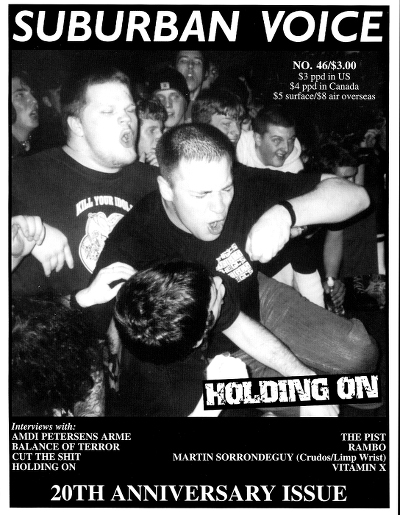
In all of your years being involved in the punk and hardcore scenes, who are some of the biggest personalities you've come across, either while doing an interview, or just being around at shows?
I already mentioned Paul Bearer—he's a total character. Tony Erba from 9 Shocks Terror, Face Value, Fuck You Pay Me, etc. is also a larger-than-life personality who I'm proud to have as a friend. He told me he used to call me from his mother's basement in the '80s (I vaguely remember that) and was grateful that I'd take the time to talk to him. I told him I was grateful that he was one of the people who got me listening to good hardcore again. Seeing 9 Shocks in 1997 caused the proverbial lightbulb to go on over my head again.
It's just been cool getting to meet musicians and bands that have meant a lot to me, and I'm grateful that I've managed to stay in contact with some of them. And it's gratifying that they've been supportive of my various projects over the years.
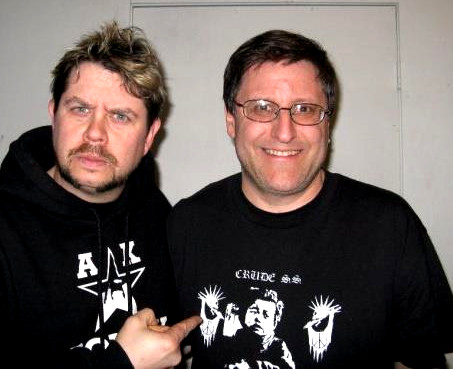
I would love to hear who you think were some of the most overlooked bands of the punk and hardcore scenes since the '80s. After all, you turned me on to so many great records through the zine back when I was still a teenager.
Such a long list. I actually think some of the '80s bands that might have been popular back then might not be remembered as much as they should. I always thought The Offenders were completely underrated, for instance. I'm not sure how many people would remember Amdi Petersens Armé since it's been almost 15 years since they were together, and they are one of the best live bands I've seen in this century. Some '90s-era bands on the Amphetamine Reptile label like Guzzard and Hammerhead were killer and maybe escaped some notice.
There were some great bands from here who didn't always get the notice they should have, like Moving Targets, Sorry, or Native Tongue. They weren't hardcore bands (Native Tongue were straight up post-punk, actually) but had a high energy level and kind of stretched the parameters a bit. I'm not even sure if Showcase Showdown, who are one of my favorite '90s-era bands from here, are well-known to the youngsters or ever made a lot of noise elsewhere.
There's a kid reading this interview who is just getting into punk and hardcore. What are five records they absolutely need to pick up to get started?
Only five? Well this is always subject to change but...
- Iggy & The Stooges, Raw Power
- Black Flag, Damaged
- Discharge, Hear Nothing, See Nothing, Say Nothing
- Wire, Pink Flag
- Jerry's Kids, Is This My World?
***
Head to Sonic Overload to hear Al Quint's radio show, plus give him a follow on Twitter.

